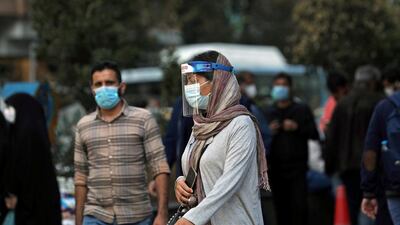Iran has vaccinated its first health workers with Russia's Sputnik vaccine, publicly inoculating the son of the health minister in an attempt to win public confidence in the shots.
"We begin our national vaccination against the Covid-19 virus... (in) memory of the martyrdom of health workers," Iran's President Hassan Rouhani said at a ceremony at a Tehran hospital.
The first vaccination was broadcast on the state affiliated Tasnim TV channel.
Further vaccinations will be given to medical staff tending to cases in intensive care units from today, Iranian Health Minister Saeed Namaki told the state-run Islamic Republic News Agency on Sunday.
About 1.3 million of the most vulnerable people will also receive their first shots by March 20, or the end of the current Iranian calendar year, according to a statement on the government’s official website.
Ali Raisi, spokesman for the government’s coronavirus task force, said the vaccines would be free of charge.
Iran has reported more than 1.4 million cases and almost 60,000 deaths.
Officials have blamed US sanctions for hampering their ability to contain the disease and ward off economic collapse.
But the government was also slow to close down large public gatherings, including visits to shrines, and was accused of keeping airports open for flights from China for a prolonged period, when other countries were closing their borders.
Supreme leader Ayatollah Ali Khamenei’s decision to ban British and US-made vaccines as untrustworthy could further complicate efforts to stabilise the outbreak and begin recovery.
But Iran has secured about 4.2 million doses of the British AstraZeneca-University of Oxford shot through the global vaccine system backed by the World Health Organisation.
Iran’s ambassador to Russia, Kazem Jalali, said the countries would soon finalise an agreement for Iran to produce Sputnik V by April, state TV reported.
On Sunday, while the country reported 7,065 new infections overnight, the number of daily deaths from the virus dropped to 57, the lowest figure since May 2020.
Iran also unveiled its second locally developed vaccine, called Razi Cov Pars, a recombinant protein-based vaccine developed by state-owned Razi Vaccine and Serum Research Institute.
The first clinical trial phase of Coviran, the country’s other homemade vaccine, was completed last week with 56 volunteers and is expected to be approved for use by the general population in summer, officials have said.


